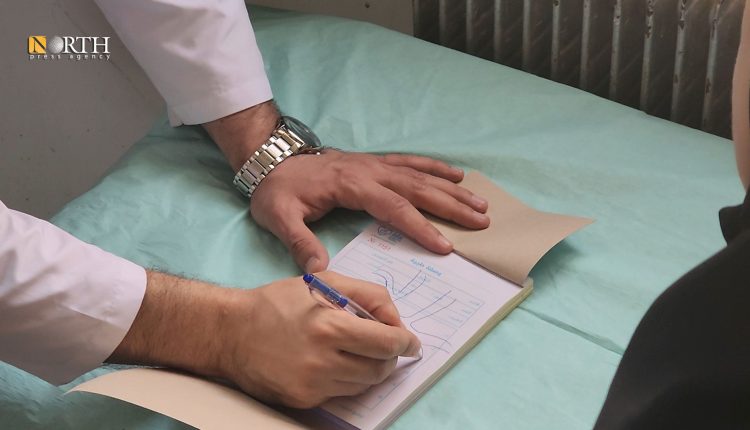
By Hussam Shahin
DEIR EZ-ZOR, Syria (North Press) – Syrian vascular surgeon Dr. Wael al-Deiri appeared visibly distressed as he examined patients at Deir ez-Zor’s National Hospital.
Now based in Germany, al-Deiri returned to his hometown as part of the volunteer medical campaign “Shifa” (Healing)—a humanitarian initiative launched by expatriate Syrian doctors to offer critical medical services in Deir ez-Zor and other underserved Syrian regions.
“The medical equipment here simply does not meet the needs of the patients,” al-Deiri told North Press, describing the situation at Deir ez-Zor National Hospital.
Most diagnoses currently rely on outdated patient records, basic clinical assessments, or a few functioning devices, which he said made proper vascular diagnosis extremely challenging.
Despite the limitations, the hospital has managed to conduct cardiovascular surgeries in line with its modest capabilities. Patients requiring more complex procedures are being referred to better-equipped hospitals in other parts of Syria that remain functional despite the devastating war.
Al-Deiri noted the absence of essential diagnostic tools such as CT scans, grayscale imaging, and angiographic devices—equipment critical to assessing and treating cardiovascular conditions.
The “Shifa” campaign is operating within a crumbling health system. Over a decade of war has decimated Deir ez-Zor’s medical infrastructure.

Of the 10 hospitals that once served the governorate, only two remain operational. Out of 106 health centers, only one-third are functioning, according to a local medical source.
At Deir ez-Zor National Hospital, just 13 of 24 medical devices are still in working order. Most were installed around the year 2000 and are now well past their service life.
For many residents, the “Shifa” campaign is a lifeline. Somaya al-Nasser, 45, said she turned to the hospital after hearing of the campaign, hoping to receive free cardiac catheterization.
“The worsening economic conditions have left us no choice but to rely on free treatment,” she explained, expressing deep gratitude to the volunteer doctors: “Their compassion has brought hope back to Deir ez-Zor.”
In response to the campaign, Syria’s Transitional Government’s Health Ministry opened online registrations for eligible patients to receive surgery in participating hospitals, including major medical centers in Damascus, Homs, and Aleppo.
Asmaa Ashour, 35, a local teacher, was diagnosed with clogged arteries and referred for surgery following her visit to the hospital’s vascular clinic. She echoed a sentiment shared by many: “We need more of these initiatives to help ease the suffering left by war and economic hardship. Campaigns like this are a sign of progress.”
The “Shifa” campaign, launched on April 7 by the Syrian Gathering in Germany (SGD) and Independent Doctors Association (IDA), runs until April 26 under the slogan: “Hand in Hand for Syria.” Over 100 expatriate Syrian doctors from the European Union and the UK are participating, with specializations ranging from neurosurgery and orthopedics to cardiology and pediatrics.
